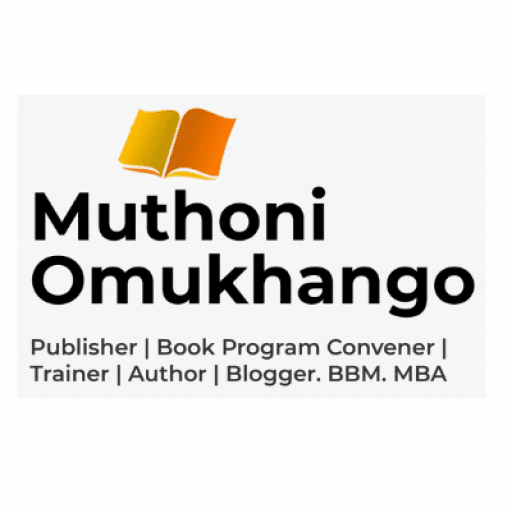Presentation by Washington Blessing, Author – It’s About Time & More Than a Tithe
What is an Author’s Brand?
Many people wrongly equate brand to a logo or website colors and although these are brand elements, a brand is much more than just these graphic aspects.
For instance, Safaricom is much more than the green Mpesa colors we know. I doubt that you would change your line to Airtel if they changed their colors to green. It is about much more than the color. It’s the entire company and what it represents.
As an author, your brand is everything people perceive you as. It’s your personality, every word you write, the fonts and colors you use, the way you make people feel when they read your books or visit your website.
A brand not only tells the world who you are and what you stand for, it also encourages target readers to align with your brand. As an author fully in control of their brand, you can more easily attract your ideal readers to enable them to form a deeper connection with you. Your brand will connect you to the right readers and you will never have to ‘sell’ a book.
A good example of an author’s brand would be Dr. John Maxwell. The moment you hear his name something comes to mind. His brand. When you hear the name of the author Robert Kiyosaki something comes to mind.
It’s not just what they write about but what we perceive them to be experts in because their branding has told us what to expect from them. As a result, we as readers have aligned with their brands. When I think leadership, I think John Maxwell and when I think of riches, I think Robert Kiyosaki (Rich Dad poor Dad).
Question, for instance, if an author is passionate about Family (parenting to be precise) and Missions work (Teaching/Training) and Publishing (which is diverse, editing, authors management etc) how can they brand themselves considering that different groups know them very differently.
Normally even though you may be diverse in your genre as an author there is a leading field in which you will be known for more than the rest. Remember the brand is what your readers perceive you as. Once you realize this area, what you do is to leverage it to be known on other areas as well.
A good example is Coca Cola. Though we know them for Coke the soda, they branched out to other sodas, water and even coffee. Their leverage base was the success of Coke as a soda. Then they built other brands on this.
How to look at this is – what is one thing people can associate with you? Mwangi of Equity Bank is associated with banking although he is an investor in real estate and NSE. PLO Lumumba is associated with Public speaking though he is a lawyer and an author. So what describes YOU?
It’s for this reason most pastors are successful authors and make a lot of money from writing. It’s all because first they are pastors e.g. Myles Munroe, TD Jakes, Rick Warren and so on. Their brand is ‘pastor’ and then author comes in as a secondary thing.
Seven ways to build your brand as an Author:
1) Identify your reader
First up you need to identify who are your ideal readers. Who is it that will align best with the books you write and who is most likely to buy?
2) Develop your brand voice
Look inwardly at yourself. How do you want others to see you? What do you want people to think when they hear your name?
3) Figure out your Unique Selling Point (USP)
How are you different? If you’re a leadership author, what makes you different to all the other Leadership authors?
4) Set some expectations
The aim of your brand is to tell your readers what they can expect from you. When you are consistent it helps people to get to know, like and trust you, which is essential when growing an author platform.
5) Know what you’re branding
The key is to brand you, not your book. This is particularly important to remember if you are writing your first book, as it can be easy to make everything about your baby, the book.
6) Choose a look
This is the part that most people think of when they think about brand. It’s the color, graphics and visual cues, photos, typeface and logo! When choosing a look for your brand there’s no need to be fancy, just remember the key is to be consistent.
7) Apply your brand everywhere
Consciously implement your brand everywhere – your social channels, promotional bookmarks or business cards, even your email signature. Remember it’s not simply about the look, but also what you say and how you say it.
Should an author define their brand before or after writing the first book?
The key is to brand you, not your book. This is particularly important to remember if you are writing your first book, as it can be easy to make everything about your baby, the book.
This is very important because being an author is a journey and over time you will write many books. The consistent point will be the author.
A good example is Toyota. They have many models such as Prado, RAV4, Noah, Vitz, Probox and even one called Corona (yeah it came before the disease and maybe after this it needs a name change). Yet they always talk of Toyota more than they promote the various models under the Toyota brand.
So Toyota Brand is reliable, durable but affordable, easily accessible, economy cars. That’s why they say the car in front is always a Toyota. Now with that, they can make whatever models (in our case book titles) they want. The author must be known for something admirable to his readers. Once this is in place, it is easy for them to pick any tittle as long it has your name on the cover.
In conclusion I would like to summarize author branding like this:
Author branding is about connecting your work to the readers who will appreciate it most.
You can also check the link below on youtube for different insights into author branding.
Author Branding Video
The books am writing are all very different. I even have some poems I wish to publish. Does it suffice to say that the person(author) is a separate entity from the products (books)? So the brand is based more on the persona?
Out of all the different tittles you are writing you will be known for one more than all the others. This will be your author brand
.
While the brand is around your persona it is intricately linked to your books. They are note separate but complementary as your persona connects to your readers and the books add credibility to your persona.
Branding also requires time to build. I am sure young Authors are now able to choose the brand they what to build, follow that line, perfect and become not just an Author but also an authority.
I thought writing a book was difficult until I got into the market. My question is what should be in the authors brand pack. Is there sort of a checklist?
I can share some insights. It will include
1) Social media branding – be consistent in all platforms z
2) Author Bio – upload this on various sites for better visibility e.g Amazon.
3) Author website and blog
4) Other promotional materials e.g bookmarks, business cards etc
5) Book branding – normally done during the publishing process also contributes to your overall brand as an author. CLC will do a great job on this.
ABOUT THE CONTRIBUTOR
Washington Blessing is an author, counselor and speaker in addition to having a wide experience in the sales field. He has been working with various multinationals with regional headquarters in Nairobi, Eastern Africa’s economic hub and has travelled widely within the region in various capacities in the sales and marketing divisions. He enjoys travelling and is an avid reader. In addition he speaks to various audiences in Kenya on the topics related to productivity training and personal finance.
Together with his Wife Grace, they live in Nairobi and run TULIP Sanctuary, a thriving Christian fellowship in Nairobi, which runs various missions and has focused widely in evangelism while empowering widows and orphans in Kenya.
You can reach him on the following emails: wkinya@gmail.com or Washington@tulipsacntuary.org






